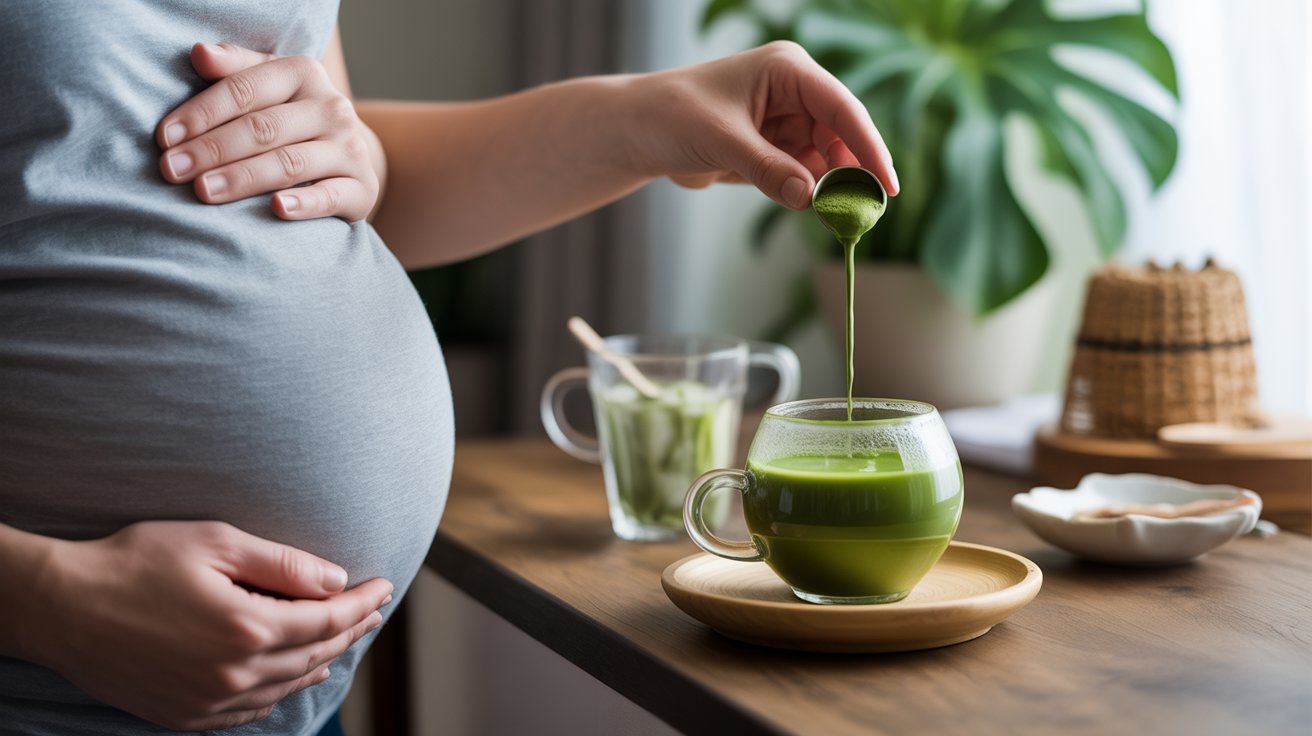Can you drink matcha tea while pregnant? Yes—if consumed in moderation. Experts recommend limiting total daily caffeine to 200 mg, which is roughly one cup of matcha.
But here’s the twist: not all matcha is created equal. Some blends pack more caffeine than you’d expect. And during pregnancy, every milligram matters.
While matcha offers antioxidants and a gentle energy boost, it can also interfere with iron absorption or pose risks if overdone.
So, how do you enjoy the benefits without crossing the line?
In this guide, I’ll break down how much matcha is safe, the real risks, surprising benefits, and what leading health sources like MiracleCord, Matcha.com, and Sipspa say about drinking matcha while expecting.
You’ll get clear, medically-aligned answers—plus simple tips to help you make safe, confident choices throughout your pregnancy.
Let’s make sure your matcha moments are both calming and pregnancy-safe.
What Is Matcha & Why Is Caffeine a Concern During Pregnancy?
Matcha isn’t just another type of green tea. It’s more concentrated—and that matters during pregnancy.
Here’s why:
Matcha is made from whole green tea leaves ground into a fine powder.
Instead of steeping and discarding the leaves, you consume the entire leaf when drinking matcha.
That means you get more caffeine, more antioxidants (like catechins), and more L-theanine per cup than standard green tea.
L-theanine can help calm the nervous system. Catechins fight oxidative stress. But the higher caffeine content? That’s where you need to pay attention.
According to Matcha.com, The Bump, and Sipspa, one serving of matcha can deliver nearly double the caffeine of traditional green tea.
How Much Caffeine Does Matcha Contain?
Caffeine in matcha isn’t one-size-fits-all.
1 gram of matcha contains around 35–40 mg of caffeine.
A standard serving (1–2 teaspoons) can provide 35–80 mg of caffeine—depending on the quality and preparation.
This means just one cup of matcha can use up half or more of your recommended daily caffeine limit during pregnancy.
According to MATCHA DIRECT, matcha’s caffeine content can even surpass that of some black teas.
Why Limiting Caffeine Matters During Pregnancy
Too much caffeine during pregnancy isn’t just about feeling jittery—it can pose real risks to your baby’s development.
Research and guidance from The Bump, Health, and MATCHA DIRECT show that excessive caffeine intake is linked to:
Increased risk of miscarriage
Low birth weight
Delayed fetal growth
Higher risk of preterm delivery
Even The Sun highlighted studies suggesting that caffeine, even in moderate doses, can cross the placenta and affect fetal heart rate.
Your baby’s body doesn’t metabolize caffeine the way yours does. That’s why most health authorities urge pregnant women to keep it under 200 mg per day.
How Much Matcha Is Safe While Pregnant? (Caffeine Limits)

Health organizations like ACOG, NHS, and the World Health Organization agree:
Pregnant women should limit caffeine to 200 mg per day.
That includes all caffeine sources—coffee, tea, chocolate, soda, and matcha.
Even MATCHA DIRECT advises that while matcha is safe, staying below the 200 mg threshold is critical for fetal safety.
Matcha-Cup Equivalents & Serving Guide
Let’s break it down:
1 tsp matcha = 35–50 mg caffeine (depending on the brand)
1 cup matcha = 35–80 mg caffeine
So if you’re also drinking a small coffee or eating dark chocolate, you could easily exceed your daily limit.
To stay safe:
Stick to 1 cup of matcha per day
If you’re using a high-grade matcha powder, use a flat ½ tsp per serving
Avoid combining matcha with other high-caffeine drinks
These tips come straight from real-life discussions on Reddit, expert guides at Matcha.com, and articles on Het Kleinste Huis.
Trimester Considerations & Adjusting for Other Caffeine Sources
Your caffeine tolerance changes as pregnancy progresses.
First trimester: Fetal organs are developing—so you may want to limit matcha even more.
Second & third trimesters: Blood volume increases and caffeine metabolism slows, which can make even small amounts feel stronger.
Also consider:
Coffee, chocolate, energy drinks, and soft drinks all contain caffeine.
Track your total daily intake—not just from matcha.
Balance is key. If you drink matcha, skip the afternoon latte. If you’ve had chocolate or soda, opt for a caffeine-free tea instead.
Read Also:
Potential Benefits of Matcha During Pregnancy
Matcha isn’t just trendy—it’s packed with nutrients your body can benefit from during pregnancy.
Let’s break it down.
Nutrients Found in Matcha That Support Health
According to Sipspa, Health, and Chalait, matcha contains:
Catechins (EGCG) – powerful antioxidants that help reduce oxidative stress
L‑Theanine – promotes relaxation without drowsiness
Chlorophyll – detoxifies and supports immune health
B-complex vitamins – help convert food into energy
Iron, potassium, and vitamin C – support blood health, immunity, and tissue repair
These nutrients make matcha more than a caffeine source. They give it functional benefits—especially when consumed in small, safe amounts.
Stress Relief and Gentle Energy Boost
Pregnancy fatigue and mood swings are real. Matcha might help.
Thanks to L‑theanine, matcha promotes calm focus and mental clarity.
Unlike coffee, it doesn’t cause sudden energy crashes or jitters.
The caffeine is absorbed slower, giving you a smoother, more balanced boost.
This gentle lift can be especially helpful when you’re dealing with low energy but still want to avoid overdoing it with coffee.
How Matcha Compares to Coffee
According to Het Kleinste Huis, matcha has:
Slower-releasing caffeine
Lower peak stimulation
Less likelihood of jitters or nausea
Plus, matcha’s L‑theanine softens the caffeine’s edge, making it easier on both your mind and stomach.
So if coffee makes you feel wired or nauseous during pregnancy, matcha could be a gentler alternative.
Does Matcha Support Baby’s Brain Development?
There’s growing interest in how tea compounds may affect prenatal development.
A recent observational study reported by The Sun found that pregnant women who drank tea regularly had babies with stronger motor skills and brain development.
While the type of tea wasn’t specified, the results point to potential benefits of polyphenols and antioxidants like those in matcha.
MiracleCord also noted these findings, suggesting moderate tea consumption may be linked to early cognitive support.
Risks & Precautions
Matcha has benefits—but it’s not risk-free, especially during pregnancy. Here’s what to watch for.
Caffeine-Related Risks: Know Your Limits
Too much caffeine during pregnancy has been linked to:
Higher risk of miscarriage
Low birth weight
Increased fetal heart rate
Sleep disruption (for you and baby)
Since matcha contains 35–80 mg of caffeine per serving, going over the recommended 200 mg/day limit is easier than you think—especially if you’re also consuming coffee, chocolate, or soda.
Always track total daily caffeine intake. One matcha = one step closer to your limit.
Iron & Folate Absorption Interference
Matcha contains tannins and catechins, which may block the absorption of key nutrients like:
Iron
Folate (vitamin B9)
Both are essential during pregnancy for fetal brain development and preventing anemia.
According to Health, here’s how to minimize the risk:
- Drink matcha 1–2 hours before or after meals—especially meals rich in iron
- Avoid pairing it with iron supplements or prenatal vitamins
Potential Contaminants in Matcha Powder
All matcha isn’t created equal.
According to MiracleCord, Chalait, and Premium Health Japan, low-quality matcha may contain:
Heavy metals (like lead or arsenic)
Pesticide residues
Added sugars or flavoring agents
To stay safe:
Choose organic ceremonial-grade matcha from trusted sources
Avoid flavored or sweetened matcha mixes
Read labels and check third-party testing, if available
Avoid Matcha Supplements & Extracts
Matcha pills, capsules, and EGCG extracts might seem convenient—but they’re not pregnancy-friendly.
Here’s why:
They deliver highly concentrated doses of caffeine and catechins
They’re harder to track and control
Some aren’t well-regulated and can contain hidden ingredients
Both Chalait and Junbi strongly advise against supplements during pregnancy.
Stick to the real thing—a small, carefully measured cup.
Guidelines for Safely Enjoying Matcha While Pregnant

You can enjoy matcha during pregnancy—but the key is moderation and mindfulness.
Follow these evidence-backed tips to stay safe and maximize benefits.
Stick to One Cup a Day (Max Two if Low-Caffeine)
Most experts, including MiracleCord and the Regional Medical Center, recommend limiting matcha to one standard cup per day.
Here’s why:
One serving (1 tsp) typically contains 35–50 mg of caffeine
Two cups could push you near the 200 mg/day caffeine cap, especially when combined with coffee, tea, or chocolate
Some matcha powders are more concentrated—check the label or brand-specific caffeine content
When in doubt, start with one cup and monitor your intake from all sources.
Choose Organic, Ceremonial-Grade Matcha
Not all matcha is safe—quality matters, especially during pregnancy.
Look for:
Ceremonial-grade matcha (fewer impurities)
Organic certification (free from pesticides and synthetic chemicals)
Products with third-party testing or traceable origin
Lower-quality matcha may contain heavy metals, pesticides, or added sugars—all of which should be avoided while pregnant.
Drink Matcha Between Meals
Matcha contains catechins and tannins, which may block iron and folate absorption.
To reduce that risk:
- Drink matcha 1–2 hours before or after meals, not with food
- Avoid pairing matcha with prenatal vitamins or iron supplements
This helps ensure your body absorbs critical nutrients needed for healthy pregnancy.
Start with a Half Teaspoon & Monitor Your Body
If you’re new to matcha—or drinking it for the first time while pregnant—go slow.
Start with:
½ teaspoon of matcha powder
Mixed with water, oat milk, or coconut milk
Enjoy once per day, then observe your body’s response (energy levels, nausea, sleep)
If tolerated well, you may gradually increase to a full teaspoon—but never exceed safe limits.
Explore Safer Alternatives
Prefer something caffeine-free?
Here are pregnancy-safe alternatives to matcha that still offer comfort and wellness benefits:
Decaf matcha – similar taste, without the caffeine
Ginger tea – supports digestion and eases nausea
Peppermint tea – calms bloating and refreshes
Rooibos tea – rich in antioxidants, caffeine-free
Lemon balm or chamomile (in moderation) – promotes relaxation
These options are recommended by Premium Health Japan, Regional Medical Center, and MATCHA DIRECT.
Trimester-Specific Advice
Your caffeine tolerance and nutritional needs shift as pregnancy progresses. Here’s how to adjust your matcha routine.
First Trimester: Extra Caution Required
Early pregnancy is a critical window for fetal development.
Matcha’s tannins may reduce folate absorption, increasing risk of neural tube defects if folate is low.
Here’s what to do:
Stick to ½ cup per day (or avoid altogether if you’re iron-deficient)
Time your matcha away from prenatal vitamins or iron-rich meals
Prioritize hydration and limit other caffeine sources
Second & Third Trimesters: More Flexibility
As your body adjusts, moderate matcha consumption is often better tolerated in later trimesters.
You can:
Enjoy up to one full cup per day, especially if you’re feeling sluggish
Use matcha as a gentler alternative to coffee
Continue to separate matcha intake from meals to protect nutrient absorption
A study cited by The Sun even suggests that moderate tea consumption during pregnancy may benefit fetal motor and brain development.
Still, moderation is key—never exceed 200 mg of caffeine/day from all sources.
Conclusion
Yes—matcha is safe during pregnancy, in moderation.
Stick to one cup a day, stay under 200 mg caffeine, and choose organic ceremonial-grade matcha. Avoid drinking it with meals to protect iron and folate absorption, especially in the first trimester.
Always discuss caffeine and nutrition with your OB-GYN, especially if you’re high-risk or have a sensitivity.
- Choose clean, tested matcha
- Time your cup wisely
- Balance with a nutrient-rich diet
FAQ
How much matcha is safe during pregnancy?
Up to one cup per day is generally safe.
Matcha contains 35–50 mg of caffeine per teaspoon. Staying below 200 mg/day (as recommended by ACOG, NHS, and WHO) helps avoid caffeine-related risks. Limit matcha to 1–2 cups max, adjusting for other caffeine sources.
Can matcha cause miscarriage or preterm labor?
Only if consumed in excess.
High caffeine intake—over 200 mg/day—has been linked to increased miscarriage and preterm labor risk. Moderate matcha use (under this threshold) is considered safe. Monitor total daily caffeine from all drinks and foods.
Does matcha reduce iron absorption?
Yes, it can if consumed with iron-rich meals.
Matcha’s tannins and catechins can inhibit non-heme iron and folate absorption, especially important in the first trimester. To avoid this:
Drink matcha 1–2 hours apart from meals or prenatal supplements
Prioritize iron-rich foods separately
Are flavored or sweetened matcha powders safe?
Some are—but many are not.
Pre-mixed matcha powders often contain:
Added sugars
Artificial flavors
Undisclosed caffeine levels
Potential contaminants (pesticides, heavy metals)
Choose organic ceremonial-grade matcha with minimal ingredients. Always check labels and avoid any with chemical additives during pregnancy.
Is decaf matcha a better choice?
Yes, if you want the taste without the caffeine.
Decaf matcha lets you enjoy the earthy flavor and antioxidants with minimal caffeine. It’s a great option if you’re sensitive to stimulants or already close to your daily caffeine limit from other sources.
Can I drink matcha while breastfeeding?
Yes, in moderation.
Caffeine can pass into breast milk, but small amounts—under 200–300 mg/day—are generally considered safe. Matcha is a gentler alternative to coffee, offering smoother energy with fewer jitters. Start with one cup, observe your baby’s response, and consult your doctor if unsure.

Md Emon is our dedicated tea specialist, passionately unraveling the world of tea—from delicate white teas and robust pu-erhs to aromatic chai blends and matcha rituals. With years of hands-on experience in sourcing leaves, studying brewing techniques, and analyzing tea traditions across cultures, he combines deep subject knowledge with practical insights. Whether you’re exploring caffeine levels, health benefits, or the art of perfect steeping, Md Emon delivers precise, research-backed guidance to steep your tea journey in confidence.

